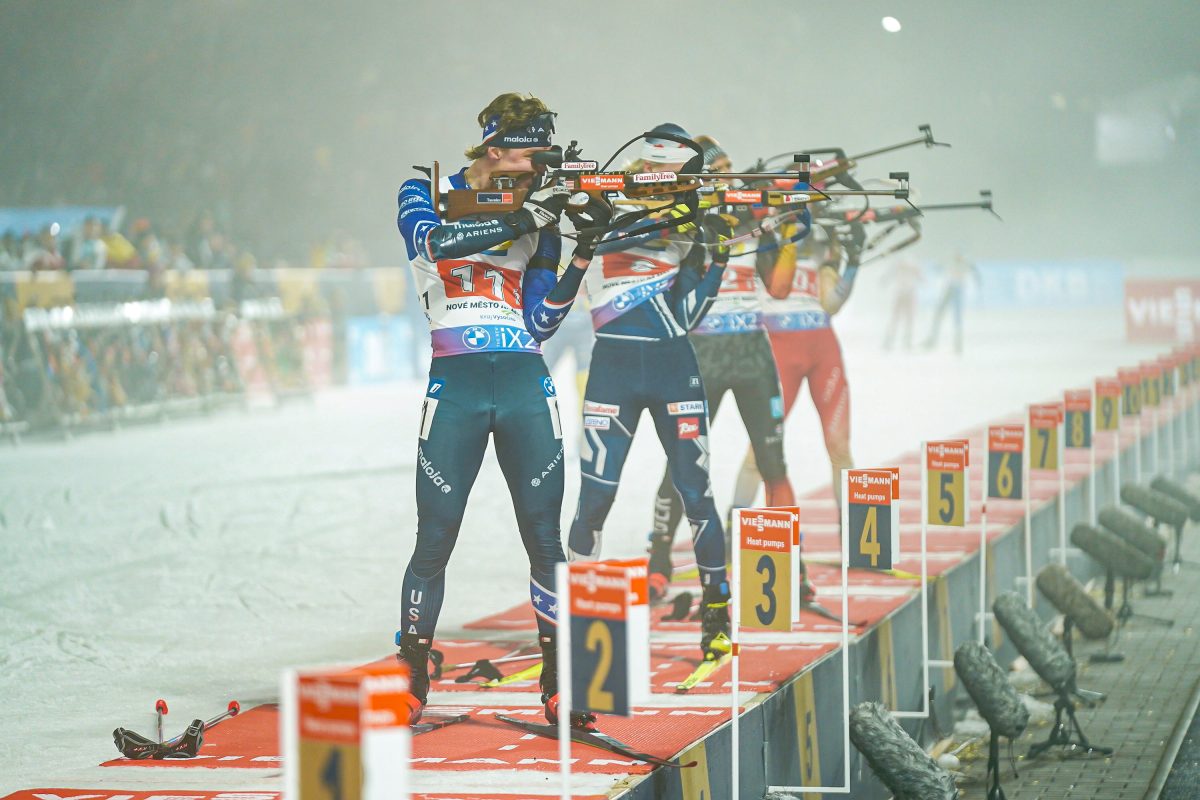
For Emil Hegle Svendsen, it was admittedly a bit of a gamble to fly to the U.S. from his home country of Norway, for a single weekend of racing.
“It’s always a risk,” he said.
But after his first of three World Cup races in Fort Kent, the trip has already paid off, thanks to the $15,000 Svendsen will collect for his win in Thursday’s 10 k sprint.
A candidate to represent Norway in the relay at the 2011 world cross-country championships in Oslo in March, Svendsen’s skiing continued to build the case that he should be selected for the team’s third leg, over Tord-Asle Gjerdalen and Sjur Roethe.
Svendsen was the fastest skier on course on Thursday, and despite one penalty over two shooting stages, he topped two others who managed to shoot clean: second-placed Michal Slesingr (CZE), and third-placed Tarjei Boe (NOR), the overall World Cup leader.
“I definitely feel like I should be the one racing [in Oslo],” Svendsen told FasterSkier. “I think I will do the best job.”
Svendsen had skipped the World Cup in Presque Isle last week, opting instead to stay at home and make up some training that he’d lost when he was sick over Christmas.
He flew to the U.S. alone, arriving in Presque Isle from Boston on Sunday on “the smallest airplane I’ve ever seen.”
With the trans-Atlantic travel, there’s always a risk for jetlag and illness, but Svendsen said that he needed the racing—and according to his shooting coach Joar Himle, the trip went “very well.”
In Fort Kent, Svendsen was greeted by cold temperatures, but he said that he didn’t mind. In fact, he said, it may

have helped, given his strong results in Oestersund, Sweden in similarly frigid conditions.
“Good Norwegian weather,” he said.
The thermometer read three degrees Fahrenheit at the start of the race, making for some squeaky, slow snow on a beautiful, still, crystal-clear day. Athletes raced in multiple buffs, with some wearing physio tape on their faces and ears to ward off frostbite.
The race was very tight at the top, with Svendsen, Schlesingr, Boe, and Martin Fourcade (FRA) all finishing in a 10-second window.
After their two bouts of shooting, Svendsen and Boe were still deadlocked at the top of the 3.3-kilometer loop’s massive opening climb. But Svendsen is known for his strength on transitions and rolling terrain, and his teammate couldn’t hang on the relatively tame remainder of the course.
“The last two kilometers are pretty flat, and I knew I needed to have a pretty big lead for the last kilometer,” Boe said. “I tried on the first hill—I took him there, but the rest of the track, he was too strong.”
Svendsen wasn’t sure how he would fare coming into this weekend’s races, but he said he had been feeling “pretty good—so I knew I had a fair chance.”
Himle, on the other hand, said he expected the caliber of performance that Svendsen turned in.
“We have to be there,” he said. “He is on that level.”
Svendsen will race twice more in Fort Kent before returning to Norway, for the lead-up to Oslo. Whether or not he’ll start at the cross-country World Championships is up to the coaches; Svendsen said that the call will be made after the men’s pursuit on February 27th. The races in Fort Kent will be a factor, he said, as well as his overall fitness.
If Svendsen indeed gets a start in Oslo on March 4, he said that the event will be, in some ways, more important than biathlon’s own World Championships, which come later in March, in Russia.
“For a Norwegian, with cross-country in your own country, World Championships—it’s the biggest,” he said. “We have world championships in biathlon every year, so I think the cross-country would be something special if I get to race.”
Svendsen certainly looked worthy on Thursday—as Boe put it, “he’s very focused, and full of energy.” That’s in contrast to Boe himself, who at 22 years old is in search of the overall World Cup title, in the same season in which he won his first race.
“It’s a hard thing to go so many races,” he said. “I feel a bit tired now. It’s only two more races to go, and then I can go back to training.”
Nathaniel Herz
Nat Herz is an Alaska-based journalist who moonlights for FasterSkier as an occasional reporter and podcast host. He was FasterSkier's full-time reporter in 2010 and 2011.



